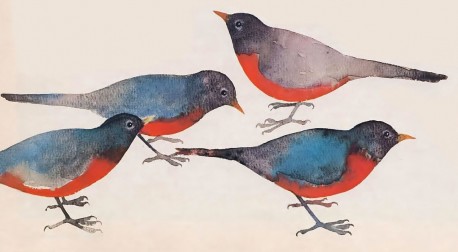With theories being established, taught, and discarded like disposable napkins, a father wonders whether his child will get a real education.
by Ravindra Svarupa dasa
In the summer of 1970, I felt for the first time the fear that parents know when their child ventures out into the world. My daughter Emily wasn’t even three years old, a toddler. Yet one morning, as I watched her walking down the street to play, I suddenly saw her facing the whole sweep other future.
At moments like this, a person really comes face-to-face with the question of education. I started to think of what I could teach her to help her through the assorted puzzles of this world. And, much to my dismay, I realized that I had nothing to say.
Not that I was uneducated, by ordinary standards. I had majored in philosophy in college, studied literature for a year in graduate school, and had gone on to two years’ study in religion, also in graduate school. Yet, though I’d pondered for some seven years the greatest works of human thought (and in prestigious universities, under the tutelage of the best professors), all that came to mind as I watched my daughter playing were the hollow slogans of the day: “Be cool,” “Don’t get hung up.”
I marveled. Was this all I had gotten from my education? Surely I had studied many sides of many issues, explored the world-views of many cultures and the Zeitgeists of many ages, traced out the thought waves of many geniuses. Still, for certain, I knew nothing. There was nothing I could give my child. And who could say she would learn anything more from her years of schooling than I had learned from mine?
Now, as I look back, I am amazed at my gullibility. I remember being a college freshman, tremulously but hopefully taking my seat in the old high-ceilinged lecture room where shining dust slowly swirled in the bars of sunlight. “Introduction to Philosophy,” read my schedule card. Now, I thought, I would really find the answers to the questions that persistently troubled me: “Who am I?” “Where did I come from?” “Where am I going?”
“What is philosophy?” asked the instructor, a thin young Englishman with blond (almost whitish) hair and a very confident manner. He began writing our answers on the blackboard.
I raised my hand. “Philosophy means trying to find out who you are, where you’ve come from, and where you’re going.”
He wrote it down.
“Yes,” said the instructor, slowly and carefully, “there is a person in this department who goes around asking those questions”—he paused—”and I reply, ‘My name is Kevin Wright, I am coming from College Hall, and I am going to Bennett Hall!'” He stood grinning at me.
I was dumbstruck—and ashamed of my naivete. Here was philosophy! The great professional thinkers of the day had concluded that real philosophers don’t bother with the kind of childish questions that bothered me.
But I remained bothered, nonetheless. By my senior year I knew well what the inquirer in The Rubaiiyat of Omar Khayyam had meant when he said:
Myself when young did eagerly frequent
Doctor and Saint,
and heard great argument
About it and about: but evermore
Came out by the same door
where in I went.
“Why are you in philosophy?” I asked one up-and-coming young professor.
“To win arguments,” he replied.
Another advised me, “Success in philosophy is understanding clearly what you’re confused about.”
I still didn’t know anything after several years of graduate school, but by then I had devised a practical test by which to judge competing philosophies. This test had nothing to do with the process of argument and speculation—from that I derived only frustration. The arguments, counterarguments, and counter-counterarguments were interminable. Besides that, to be famous as a philosopher, you had to put forth a new position; mere agreement would put an early end to your career. Therefore, since I was awash in an endless, stormy sea of differing philosophies, and since there was no hope of establishing once and for all any single philosophy as true, when various teachers would argue their positions I would just think to myself, “If I accept your philosophy, I’ll at best become the same kind of person as you. Is that what I want to be?” This was my practical test, and on that basis I never found any philosophy I could accept.
It was in that same year, 1970, after twenty years of schooling, that I finally found my first real teacher: His Divine Grace A.C. Bhaktivedanta Swami Prabhupada. Here was a man I could follow. Perfectly calm and self-assured, he radiated a personal warmth and a sincerity of purpose that were completely lacking in my previous teachers. And when he spoke the philosophy of Krishna consciousness, every syllable seemed to carry the weight of eternal truth. No tinge of doubt or cynicism or flippancy marred his words.
I was with him a few years later when he dramatically demonstrated why my so-called education had been such a disaster. Sitting behind his desk in a room filled with his students, Srila Prabhupada had just been introduced to a professor from a large university who had brought along several students of his own.
“What do you teach?” Srila Prabhupada inquired.
“Hinduism,” answered the professor.
“And what is that Hinduism?”
“I don’t know,” came the immediate response.
“You don’t know?” repeated Srila Prabhupada, his eyebrows raised in astonishment. Then he asked the question that went with Socratic directness to the basic defect of Western education:
“If you don’t know, how can you teach?”
The professor was caught by surprise; evidently, this idea had never occurred to him. He tried to evade the question by giving many reasons why he didn’t know, but Srila Prabhupada pressed his point. The logic of it was inescapable: If you don’t know something, how can you possibly teach it?
Srila Prabhupada made a further point. A person who does not know something, but who teaches it anyway, is a cheater. Again the logic was inescapable: the professor was constrained to admit, in front of Srila Prabhupada’s students and his own, that he himself was indeed a cheater.
So, I had been cheated, and what was to prevent my children from being cheated also? Education means to acquire knowledge from a teacher, but if the so-called teacher has no knowledge, how is education possible? Of course, he may instruct us in a technical skill or practical craft, but Srila Prabhupada, like the ancient Greeks, doesn’t count that as actual knowledge; it is techne, “know-how,” the mere mastery of a trade.
But the educators are keeping up the bluff. Finding themselves unable to know the truth, they fashion their own ignorance into philosophical doctrine and teach that as the truth. Their thinking seems to go something like this: “If we can’t find out who we are or where we’ve come from, then such questions are meaningless. If we can’t discover a standard of knowledge free from cultural or historical bias, then there is no such standard.” At least in this way they can give courses in ignorance and award doctorates to the most distinguished. And, they hope, perhaps no one will notice—the emperor has no clothes.
But a few of us are noticing, under the tutelage of His Divine Grace Srila Prabhupada. I can remember the very moment when the root of Western education’s problem became clear to me….
It was still and quiet, just past dawn, and a mist hung over Philadelphia’s Schuylkill River. An occasional motorist speeding along the river road could observe (with some surprise, no doubt) a small band of people walking slowly along the bank. Srila Prabhupada and a group of his disciples were taking a morning walk. The steady tapping of his cane on the pavement underscored the cadence of his soft, low voice.
“Your Western knowledge is defective,” Srila Prabhupada said. He stopped and stood firm. “It is like this: 1 see that one man has died, and another, and another, and so on.” He checked off the deaths in the air with small strokes of his cane. “Still, I think that I might not die. Just because so many have died, does it follow that I must also die? Don’t your scientists believe like that—that even though so many have died, they themselves might not? This is the defect. Your process of knowledge is ‘the ascending process.’ That process is defective, because it always leaves some doubt. All your so-called knowledge is based on this defective principle.”
I felt elated. Of course! I recalled the philosophy texts. It was the “Problem of Induction”! Suppose I want to find out whether all robins are red-breasted, and I examine n number of robins (n can be any great number, even a million). My premises and conclusions proceed something like this:
1. Robin 1 has a red breast.
2. Robin 2 has a red breast.
3. Robin 3 has a red breast.
. . . . . . . . . . . . . . . . . . . . .
n. Robin n has a red breast.
Therefore, all robins are red-breasted. Yet, although all my premises are true, the conclusion can still be false, for there is no guarantee that “robin n + 1″ won’t have a blue or green breast. Only if I examine every single robin can my conclusion be guaranteed. Of course, this test is impossible; the inductive process can never give me absolute certainty that all robins have a red breast. And, consequently, all experimental generalizations, all scientific “laws”—indeed, the entire body of mundane knowledge, which rests inevitably on the inductive process—is doubtful.
“But we know we shall die,” Prabhupada was continuing. “How? Not by speculation, but because Lord Krishna says in the Bhagavad-gita [2.27], jatasya hi dhruvo mrtyur: ‘For one who has taken birth, death is certain.’ Therefore, because God says I must die, and He has perfect knowledge—is that not the definition of God, that He has no defect?—because He says it, therefore we can accept it as true.”
“But, Srila Prabhupada,” I interjected, “Western philosophers like John Stuart Mill, David Hume, and Bertrand Russell have also noticed this difficulty with induction. But their reaction was to become skeptics.”
“Skeptics!” exclaimed Srila Prabhupada. “Skepticism is not allowed! That is another speculation!”
“Another speculation?”
“Yes! ‘Because I cannot know; therefore, no one can know.’ Just see what rascaldom this is! ‘I am ignorant, so everyone must be ignorant.’ “
In other words, the skeptic understands that because of the defect in induction, he can have no knowledge. But then, on the basis of that same faulty inductive process, he claims that no one can have any knowledge. This is “another speculation,” and thus completely unacceptable.
“This is my challenge,” said Srila Prabhupada. “I am challenging that all your Western knowledge is defective. You have no knowledge. I have come here to give you actual knowledge and defeat these rascal speculators!” Prabhupada’s fiery eyes darted at us. His words carried real authority. After all, he had behind him a five-thousand-year line of spiritual masters coming from Lord Krishna Himself.
In the car driving back to the temple, Srila Prabhupada added, “I could understand if they would simply say, ‘I don’t know.’ But instead they say, ‘Maybe,’… ‘perhaps,’… ‘it could be,’… ‘it might be.’ You are a resident of this city,” Srila Prabhupada continued, turning to me, “and a visitor here may ask you directions. Is it very good, if you don’t know, still to say, ‘Go this way’; ‘try going that way’? Better just to tell him, ‘I don’t know.’ Similarly, the so-called educators speculate, put forth big theories, and thus mislead everyone.”
I remembered that when I was in college, mankind had supposedly emerged five million years ago, and civilization had spread into Europe from Mesopotamia. But these days, humans seem to have appeared three million years ago, and European ruins predate Mesopotamian ones. The old teaching, being false, never was knowledge, and the new teaching is equally liable to change any day. In fact, a revision in the theories of human prehistory occurs practically every week.
Someone digs a hole, discovers a few bones, and constructs a theory that supposedly explains all the evidence. Then “those in the know” teach this theory as fact. Meanwhile the digging continues, fresh evidence contradicts the established theory, and a new theory emerges to become the new teaching. Then another hole… and another… and another…. The “learned sector” establishes, teaches, and discards theories like disposable napkins. At no point is there even the remote approximation of knowledge, since all these theories about the distant human past are based on diggings covering only an infinitesimal fraction of the earth’s surface. Nevertheless, so-called scientists disseminate so many “facts” about human prehistory, which the innocent public then accepts.
But can real knowledge and truth change on a week-to-week basis? If the authorities or experts keep changing their teachings, can we call such teachings knowledge? And if the experts are not transmitting knowledge, can we say that they are educating us? We’re seeing our great expert leaders are blind, and when the blind lead the blind, everyone falls into the ditch.
In The Underachieving School, educational critic and teacher John Holt vividly describes his frustrating experiences with obsolescent and amorphous knowledge. He argues that teachers and students are wasting their time and may as well “abandon the panicky quest for certainty and understanding and order and… be willing to swim, to suspend themselves—I think of a bird in air or a fish in water—in the uncertainty and confusion and bafflement in which it is our fate to live for the rest of our lives.”
Here is the cop-out of today’s educator. Confusion is king. But, just as the word hot implies that somewhere there is something that’s cold, the very word blind implies that somewhere there is someone who can see. Should we really “abandon … certainty and understanding and order” and so readily embrace “uncertainty and confusion and bafflement”? Srila Prabhupada gives us good reason to think otherwise.
The son of a career military officer, Ravindra Svarupa dasa was born in 1944. He, his wife Saudamani-devi dasi, their six-year-old son Yudhisthira, and their nine-year-old daughter Lalita (Emily) came to the Krishna consciousness movement in 1971. Since then, Ravindra Svarupa has coordinated ISKCON’s Philadelphia center. After receiving his B.A. in philosophy from the University of Pennsylvania, in 1966, he went on to graduate work, first at the University of Massachusetts and now at Philadelphia’s Temple University. He will submit his Ph.D. dissertation in April, 1977.




Leave a Reply